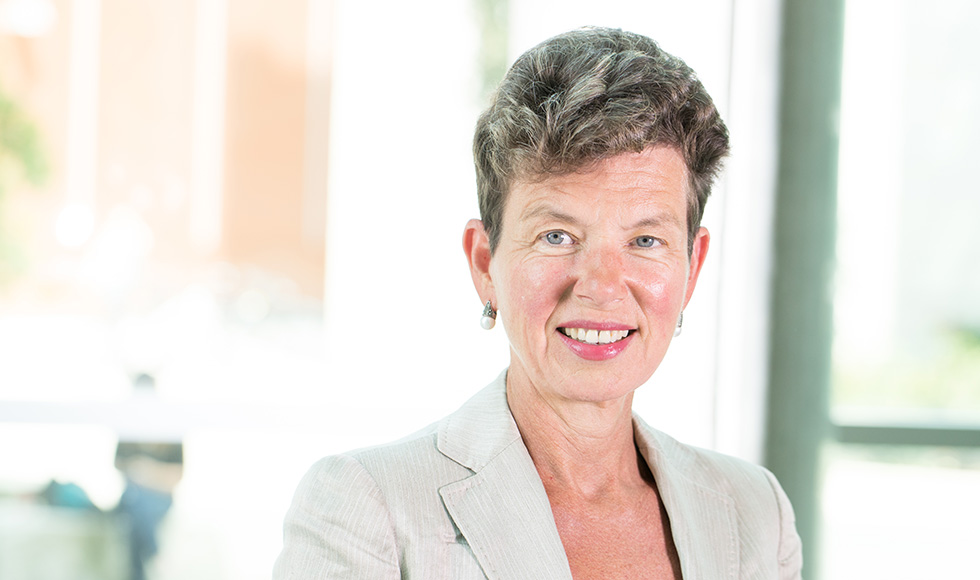A pioneer in critical care

BY Tina Depko
March 9, 2018
Be brave. Be humble. Stay humane. Lend a hand every day to your colleagues, to young people and to a worthy cause. Let your passion be your guide.
These are the guiding principles that inspire Deborah Cook every day in both her professional and personal life.
Cook is considered a critical care pioneer, as both a researcher and practitioner affiliated with McMaster University and St. Joseph’s Healthcare Hamilton.
“As a clinician at the bedside, I am aware of the challenges that critically ill patients face, and what we need to address to get them better,” she says.
“The ideas for research projects derive from my practice. I look for where the holes are to see where we need to improve our knowledge base, to help improve the outcomes for these patients.”
Cook’s research encompasses risk factors for serious illness, prevention of Intensive Care Unit (ICU)-acquired complications, life support technology and end-of-life decisions for critically ill patients. Her research is both patient and family-centred, with compassion serving as a driving force.
Her health services research has helped to translate knowledge into practice to prevent morbidity and mortality during critical illness.
“The Canadian community has contributed enormously to patient-centred critical care research globally, and McMaster, in particular, has led the way,” she says.
Raised in Dundas, Cook completed an undergraduate degree in physical education at McMaster. Working at the Health Sciences Library opened her eyes to medicine and to opportunities it afforded to help people.
She subsequently completed her medical degree at McMaster before going to Stanford University to study critical care medicine. She returned, saying McMaster offered her the opportunity to pursue her particular approach to research.
“Critical care medicine was in its infancy when I began, so as an intensivist, I was keen to make a difference in a relatively new field where there were very few clinical studies,” she says.
“It was rewarding to build critical care research infrastructure at St. Joseph’s and McMaster from the ground up. Working with our patients and colleagues across Canada, we set out to find solutions to best diagnose, monitor, treat, prevent or palliate in critical care.”
An example of her creativity is her development of the Three Wishes Project at St. Joseph’s ICU, where dying patients are honoured through legacy work that dignifies their life, and where families are comforted by diverse acts of clinician compassion to help bring peace at the end of life.
Cook has been a member of McMaster’s Faculty of Health Sciences and a clinician at St. Joseph’s for 26 years.
She is professor in the Department of Medicine and Health Research Methods, Evidence and Impact. She holds the McMaster-St. Joseph’s Academic Chair of Critical Care Medicine, and a Canada Research Chair in Research Transfer in Intensive Care.
She is a Fellow of the Royal Society of Canada, as well as an Officer of the Order of Canada.
Cook cites mentors David Sackett and Gordon Guyatt, both international legends in health research methodology and members of the Canadian Medical Hall of Fame, as having a profound impact on her development as a clinician and researcher.
She notes Guyatt, in particular, has been her key mentor.
“Gordon Guyatt is the world’s preeminent methodologist,” she says. “I feel enormously privileged that he was committed to my long-distance work while I was training in the U.S. so I could complete McMaster’s clinical epidemiology degree at a time when nobody in our field had such training. He’s a legendary teacher and it’s just great to collaborate and innovate together today.”
Guyatt has a mutual respect and admiration for his mentee.
“Deborah combines a very rare combination of qualities that include originality, brilliance, graciousness, and a profound concern for her patients as people – her research reflects all these qualities,” says Guyatt, professor with the Department of Health Research Methods, Evidence, and Impact at McMaster.
“She has become the world’s leading clinical trialist in intensive care, and the worldwide standard-bearer for evidence-based critical care medicine.”
Cook says it is rewarding to know her research has made a difference for patients and their families. She adds she is also proud to be mentoring the next generation of critical care researchers.
“I am very energized by the people I work with – trainees, staff and colleagues – and our collective mission to keep making a difference in our field,” she says.
“I am humbled to realize how much more there is we can do to improve patient and family outcomes, but also incredibly grateful to find this vocation so meaningful. This sense of purpose and passion drive my work.”


